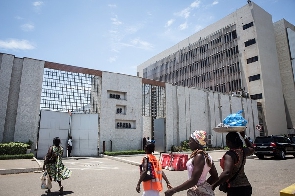Ahead of a crucial decision to be taken on a benchmark interest rate to be taken next week, Ghana’s private sector, through its main groupings, have begun lobbying for a cut in interest rates.
Next week, the Monetary Policy Committee (MPC) of the Bank of Ghana is scheduled to meet over three days, with a decision on the key Monetary Policy Rate (MPR) being taken on Friday, November 20 and that decision announced to the public the following Monday, November 23, at a press conference.
The MPR is the rate at which the BoG lends to commercial banks to solve their short term liquidity challenges. While the banks hardly ever use this option, since the recent financial sector reforms, preferring to lend among themselves to smoothen any temporary liquidity shortfalls, the MPR still serves as a key indicator of both the level and direction of change of interest rates desired by the central bank.
Next week’s meeting will be the 96th regular meeting of the MPC which meets every two months to assess the state of the company and based on this, set the MPR for the next two months.
This time around, private sector groupings, led by the Private Enterprises Federation, Association of Ghana Industries and the Ghana National Chamber of Commerce and Industry are lobbying for a further cut in the MPR following its reduction to 14.5 percent in late March, the rate at which it has been held since then.
Instructively at the last meeting of the MPC in late September, the private sector lobbied for a retention of the MPR rate in the face of fears that the BoG would raise it because of a spike in consumer price inflation. They had their way.
This time around however, inflation is declining – it is currently at 10.4 percent – and indeed shows signs that it may return to within the central bank’s target band of eight percent plus or minus two percent (ie six to ten percent) before the middle of next year as earlier forecast by the BoG’s research department.
Indeed, the BoG’s Governor, Dr Ernest Addison has admitted that it had overestimated the adverse effects of COVID 19 on the economy and had raised its projection for economic growth in 2020 to two percent, up from 0.9 percent as at mid-year.
With the BoG’s latest data all pointing towards a sharp trebound in economic growth for the third quarter following an unprecedented 3.4 percent contraction during the second quarter of the year, private sector chieftains now believe the central bank should take advantage of the economy still operating below full capacity currently to give it a monetary boost by lowering interest rates, they point out that the reduction in short term rates in recent months has not resulted in surges in either inflation or cedi depreciation, even as this has accelerated the economic rebound which could benefit further from even lower rates.
On the other hand, longer term interest rates, which have risen in recent months in a bid to retain the patronage of foreign investors in cedi denominated instruments, can now be allowed to fall as competing rates in the western hemisphere are deliberately being kept at close to zero in order to fend of economic recessions in western European and north American jurisdictions.
Importantly the cedi has remained relatively stable this year and bids at the recent forward foreign exchange auctions by the BoG suggest this trend will prevail through to the turn of the year at least meaning foreign investors will not be exposed to forex conversion losses on their cedi denominated holdings.
Left unsaid, but nevertheless anticipated is the hope that a politically motivated rate cut is on the cards ahead of the general elections scheduled for December 7, a move which would expectedly win the incumbent administration votes from the business and corporate classes.
Despite there arguments however, most economists predict that the current rate will be maintained simply because of the inordinate size of the 2020 fiscal deficit, which will reach 11.4 percent of Gross Domestic Product, a situation caused by the impact of COVID-19.
Dr Ernest Addison has repeatedly confessed that the size of the deficit is the primary reason why the BoG has withheld further monetary easing already.
Business News of Tuesday, 10 November 2020
Source: goldstreetbusiness.com

















